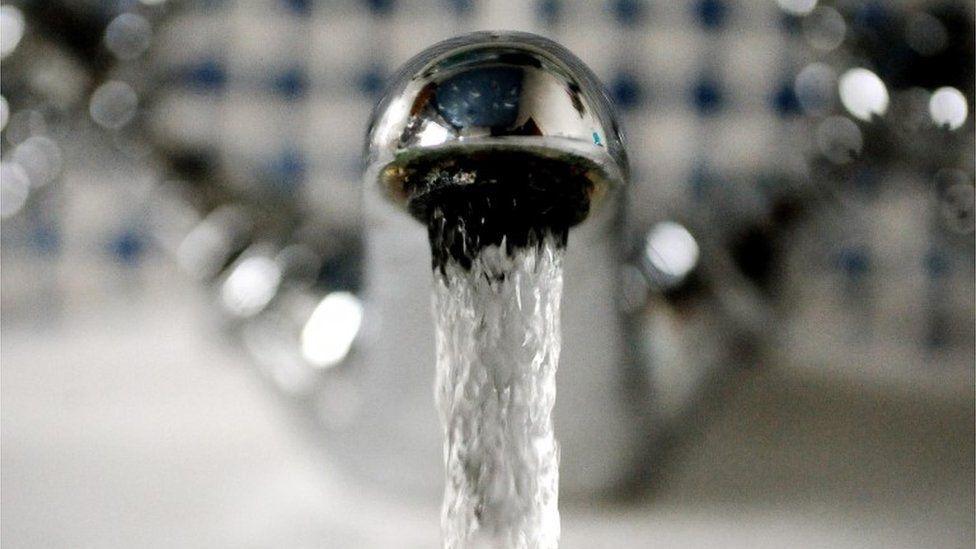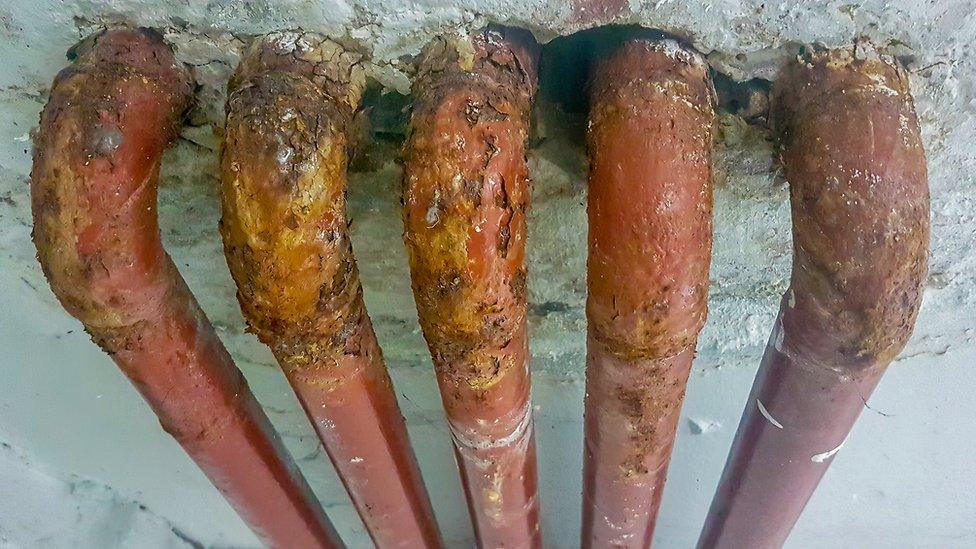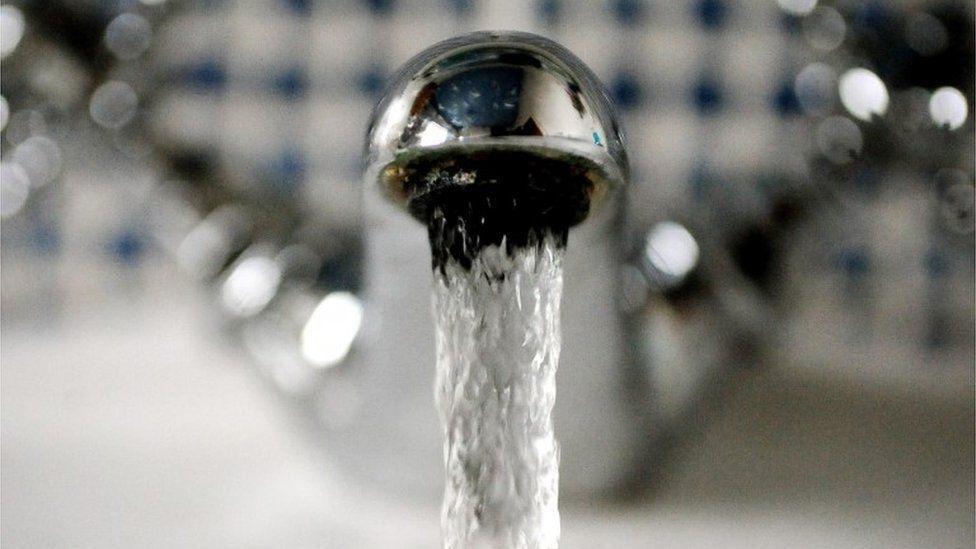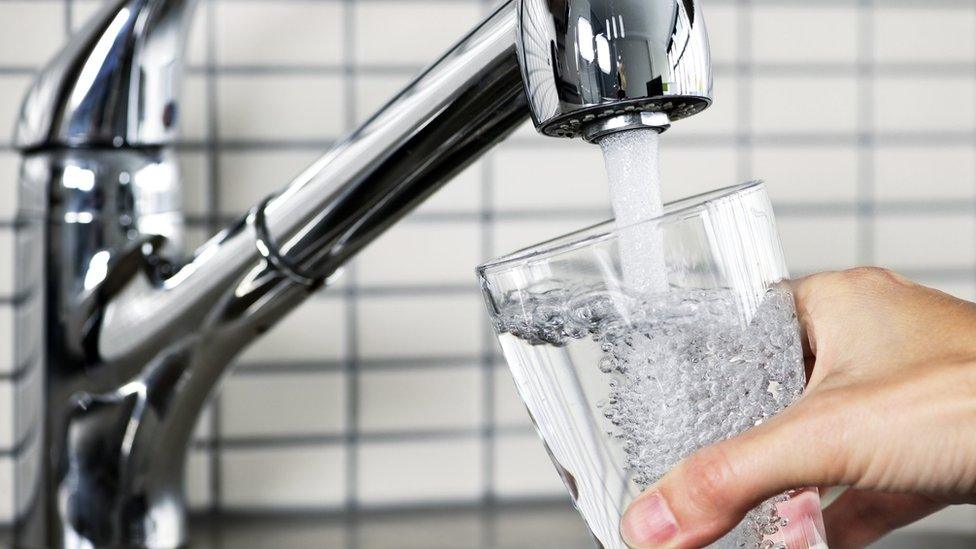Lead pipes: 'I fear for my toddlers' health'
- Published
Charlene Hegarty found lead residue in the tap water in her home
A mother-of-two has said she fears for the health of her toddler twins after being told the amount of lead in her tap water was more than seven and a half times higher than the legal limit.
Charlene Hegarty did not know there were lead pipes in her Belfast home when she bought it seven years ago.
Lead pipes are mostly found in homes built before 1970.
NI Water's worst case estimate is that 26% of all properties could still be connected to lead pipes.
That is the equivalent of nearly a quarter of a million homes.
The company told BBC News NI it was "committed to reducing the risk to its customers of lead in drinking water".
But Ms Hegarty is worried not enough is being done to make people aware of the potential dangers.
The 36-year-old made the discovery after finding residue in her water. She contacted NI Water which took a sample for testing.
'We were fearful'
After some confusion over whether it was tested for lead, she received a letter from Belfast City Council advising her of high lead levels in her drinking water.
"I've got two young kids and we give them tap water as the healthy choice. They don't have fizzy drinks because we're trying to promote a healthy lifestyle, " Ms Hegarty, who lives on Loopland Crescent in east Belfast, said.
"I adhere to a healthy lifestyle. I run. I drink two litres of water a day because that's good for you - that's what we're told.
"It brought it into sharp focus that the tap water can't be presumed as safe when lead is potentially in the property.
"My lead reading was 76 when the acceptable standard at the minute is 10. That was really quite alarming.
"We were fearful. I just didn't trust what was coming out of the tap was right and safe at that point."
Experts have warned of the dangers of lead exposure to public health, with children particularly vulnerable. It can affect their development and kidneys.
The maximum concentration of lead permitted in drinking water in the UK is 10 micrograms per litre.

Low level lead contamination can lead to brain damage
An academic at Queen's University Belfast who is researching the extent of lead in the city said there was no safe level of exposure to the metal.
"My concern mainly is for children, children under the age of five whose blood brain barrier isn't fully formed and lead wreaks havoc on the synapses in their brains," Dr Tristan Sturm, a senior lecturer in geography, said.
"This leads to kids who unfortunately will underperform. They won't contribute to the economy in the same way as children who weren't exposed to lead would. It's tragic.
"There is no safe level of lead exposure. In public health there's often the assumption that if you just reduce the level of something it will be safe.
"This isn't the case with lead. Even at low levels it can have long-lasting or permanent damage to a child or an adult.
"In the United States, for the past 10 years they've been having this conversation about lead exposure from water pipes.
"They've exposed the significant harms in places like Flint Michigan. We need to have the conversation here and we need to start testing our water properly."
Since 2013, NI Water has replaced 9% - or more than 23,700 - lead communication pipes.
Communication pipes bring water from the main supply up to the boundary of your home.

Four years ago, it estimated that it would cost about £150m to replace them all.
It has spent about £1m each year for the past seven years on its lead pipe replacement programme.
NI Water will only replace the communication pipes, stating it is the homeowner's responsibility to replace lead pipes within the boundary of their property.
This can cost hundreds or even thousands of pounds. While there are grant schemes to help with the cost in the Republic of Ireland and parts of the UK, there is no help in Northern Ireland.
'A human right'
Ms Hegarty said she felt fortunate that she could afford to replace her pipes but believed financial support should be available.
"When it's a public health safety issue like this, the government needs to do more. They need to put money into people's pockets to get this work done," she said.
"Whenever it comes to safe and clean drinking water, that's a human right. You can't make it any clearer than that."
NI Water told BBC News NI that it was "committed to reducing the risk to its customers of lead in drinking water".
It said it had been adding a chemical to the water since the early 2000s which "provides a protective coating to the inside of lead pipes and is considered to be the best way to provide widespread protection to customers".
"There is almost no lead in drinking water when it leaves our water treatment works or in our water mains. Any lead in drinking water usually comes from lead service pipes in the home."
Related topics
- Published23 June 2022

- Published19 March 2022
